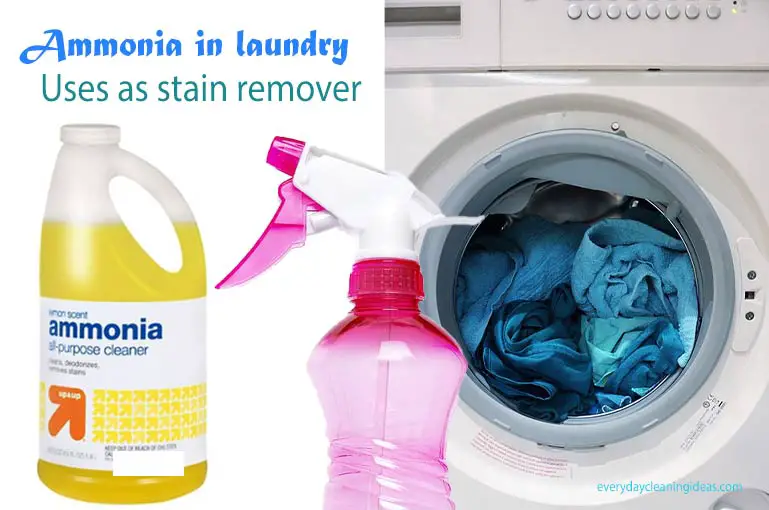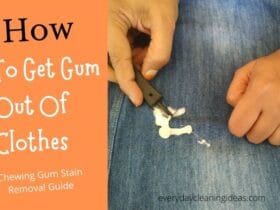Ammonia, a naturally occuring, colorless gas, is the key component in the manufacture of various products that we use in our day to day lives.
Ammonium Hydroxide, or household ammonia, is an ingredient in many household cleaning products.
Sure you’re thinking – “If it’s used in cleaning products, then it must be useful in washing to help clean things better. It must be good for laundry… or is it?”
You are absolutely correct.
Ammonia As An Additive
Ammonia in laundry, or as a laundry additive, is pretty versatile. It vanquishes stains and removes grease, whitens white clothes and softens your towels.
Does ammonia bleach clothes?
Ammonia is not as strong a chemical as bleach, and as such does not remove or fade away dyes as bleach does. It helps clothes look brighter and clean without any damage to the fibre.
You can even use clear ammonia on dark clothes without any fear of discoloration.
So, will ammonia bleach clothes? The answer is a resounding “No”.
Can ammonia kill germs?
The question of whether washing clothes in ammonia can disinfect them is a complex one. You see, ammonia removes fat, oils and grease- and some common bacteria use an oil covering to protect themselves. Those bacteria will be killed by ammonia.
Some bacteria (and all viruses) don’t play by those rules, and ammonia will not affect them. So, does ammonia kill germs in laundry? Yes, but it depends.
Using ammonia in the washing machine
So, can you use ammonia in the washing machine? Of course!
Now for the big question: how much ammonia is too much ammonia? Ammonia is a pretty strong chemical, so if you’re washing clothes in the machine – add no more than one cup to a full load, along with your detergent.
Do take care that your detergent isn’t bleach based – ammonia makes bleach stronger and it can make your clothes fade rather fast.
Ammonia Safety Precautions
There are some precautions you must take before you handle ammonia. Ammonia releases fumes, and if used near to other cleaners, it might set off dangerous reactions. To avoid mishaps, here’s what you should be doing.
-
Only use clear ammonia
Colored products, no matter what they may be, risk staining your clothes, especially light colors.
Also, make sure that the ammonia you are using is household ammonia- ammonia used in labs is far too strong for household use and could potentially damage your belongings.
- Avoid using ammonia on wool and silk
Ammonia eats through natural protein- including the ones in those fabrics.
-
Always wear gloves when handling chemicals
This one is a no brainer. Wear gloves as a safety precaution no matter what chemical you are working with, and always make sure to work in open areas where fumes will not suffocate you.
- Keep out of reach from children
Children may be smart enough to recite an entire ballad, or ask you questions that make your own head spin, but they are not good at recognizing the risks and hazards ever present with chemicals.
In case you have children and pets at home, store ammonia in a place where they cannot reach.
- Never mix ammonia and bleach
I cannot stress this enough. Mixing chlorine bleach and ammonia releases chloramine, a toxic vapor- which in large enough doses can make you sick, even kill you. I repeat, NEVER MIX AMMONIA WITH BLEACH.
Using Ammonia in Laundry
Sufficiently prepared?
Good.
Let’s go over some ways in which you can use ammonia for cleaning clothes.
As a stain remover
Ammonia is a stain remover, and there are two ways of preparing a solution that will effectively remove those annoying discolorations.
Method 1:
- Mix equal parts of ammonia, water and non-bleach detergent and store it in a spray bottle.
- You can spritz this concoction of food, ink, grass and other varieties of stains.
- Leave this mixture on top of the stain for about 30 minutes, before you rinse them, then launder your clothes the usual way.
- The clothes should be cleaner and stain free on taking them out of the wash.
Method 2:
- A more gentle solution that you won’t need to rinse before washing involves taking lower amounts of ammonia.
- Mix ½ ounce ammonia with 1 ounce of detergent, and 2 cups of water. Apply on the stain and leave for 30 minutes before laundering.
- Note that since this has less soap, it is less effective. It is useful, however, for milder stains and discolorations such as sweat stains.
Whiten clothes better
Sure, you use bleach to get that shiny white glow on your clothes.
But have you noticed that you end up using it more and more as time goes by?
Chlorine bleach, while popular as a whitening agent, is harmful to clothes in the long run. Use it long enough, and even fabrics like cotton will turn yellowish and rough.
You can avoid this by simply using ammonia in place of bleach. Instead of adding bleach to the wash cycle, use a cup of ammonia instead- it’ll whiten without harming the natural fibres, and make sure they stay white for far longer.
Soften Towels
Ever notice that your towels become hard and starts to almost graze your skin? It’s because of hard water residue, forming mineral deposits that roughen the towel.
You can use ammonia to dissolve these wax and dirt deposits by once again, adding a single cup of it to your wash cycle.
Grease Removal
Oil is annoying when it spills on your clothes because of how you have to scrub it off before you can launder it.
But remember that little thing you read about ammonia at the start- about how it dissolves oils and removes them?
Simply mix some bleach-free dish detergent with ammonia and dab it onto the affected spot before laundering it. An easier, hassle-free way of solving the problem!
Ammonia and Baking Soda
In its own right, baking soda is a fantastic laundry additive. It is a natural deodorizer and cleaner, and a pretty strong one.
The downside of it is that it takes much longer to start acting on the fabric, and your daily life probably doesn’t allow you enough time to work with.
If you mix ammonia and baking soda for laundry use, you’ll notice that it takes the strength of baking soda and the speed of ammonia- creating a strong, fast acting solution for stubborn stains on cotton, nylon and polyester.
The best of both worlds, one might say.
For this you will need:
- ⅔ cup of clear ammonia
- ⅔ cup dish soap
- 6 tablespoons of baking soda
- 2 cups of warm water
Mix these ingredients in a bucket and soak your cloth stains in this mixture with a sponge or a cloth.
Let it sit for about 30 minutes before laundering them as usual.
If this proves to be too weak a solution, treat the stain again, now with 1 part of ammonia with 1 part of water before laundering the clothes.
Clearing Mildew
Mold and mildew build up with moisture, and are extremely hard to remove. If you have accidentally left certain items of clothing in cold, damp, dark places, you could use ammonia to kill off the mildew, and here is how.
- Take an old toothbrush to wipe off the visible mildew stains. It’ll ensure that it doesn’t spread to your other clothes as you are washing it. Clean the toothbrush thoroughly once you finish.
- Mix one part ammonia with an equal part of water.
- Apply the mixture to the stained spot with the now clean, old toothbrush, gently rubbing it till you see the stain begin to lift.
- Let the mixture sit for 15 minutes and then rinse it off.
- Launder the clothes as usual. The mildew stains should have vanished.
Clean your Carpeting
While not exactly a part of your daily laundry, your carpet is an often overlooked part of your upholstery that gets easily stained all too often.
- Mix one part clear ammonia and one part hot water and pour into a bottle or a spray bottle.
- Locate your stain and spray or apply the solution with a sponge.
- Let it sit for ten minutes, after which you must take a clean old towel and a steam iron.
- Place the towel on the stain and press with the steam towel for at least 20 seconds.
- Check your progress- you will find the stain starting to transfer to the towel.
- Repeat the process until the stain is fully transferred, reapplying ammonia solution as necessary.
And now you’re ready.
Ammonia is super cheap, and a far more cost effective solution compared to the fancier, top the line brands out there.
It’s simple, readily available and powerful- being able to give your clothes a shine that rivals even that fancy detergent you know is too expensive to even bother buying.
Happy thrifting!









Leave a Reply
View Comments